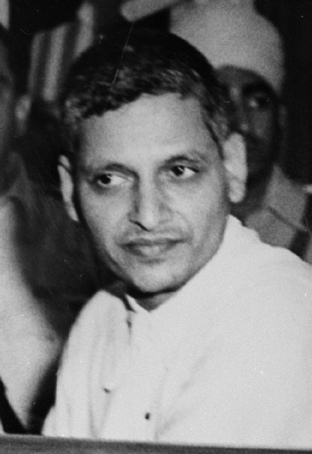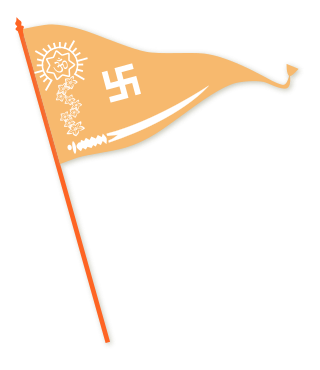Bunkar Mahasabha is a trade union of weavers in Varanasi, India. Bunkar Mahasabha was formed in 2001. The union is affiliated to the All India Central Council of Trade Unions.
Bunkar Mahasabha is a trade union of weavers in Varanasi, India. Bunkar Mahasabha was formed in 2001. The union is affiliated to the All India Central Council of Trade Unions.

Nathuram Vinayak Godse was a Hindu nationalist who on 30 January 1948 assassinated Mahatma Gandhi. Godse was a member of the political party, the Hindu Mahasabha; and a member of the Rashtriya Swayamsevak Sangh (RSS), a right-wing Hindu paramilitary volunteer organisation; and a populariser of the work of his mentor Vinayak Damodar Savarkar, who had created the ideology of Hindutva.

Vinayak Damodar Savarkar, Marathi pronunciation: [ʋinaːjək saːʋəɾkəɾ]; 28 May 1883 – 26 February 1966) was an Indian politician, activist and writer. Savarkar developed the Hindu nationalist political ideology of Hindutva while confined at Ratnagiri in 1922. He was a leading figure in the Hindu Mahasabha. The prefix "Veer" has been applied to his name by his followers.

The Akhil Bharatiya Jana Sangh (abbreviated asBJS or JS, short name: Jan Sangh, was an Indian nationalist political party. This party was established on 21 October 1951 in Delhi, that existed from 1951 to 1977. Its three founding members were Shyama Prasad Mukherjee, Balraj Madhok and Deendayal Upadhyaya. Jan Sangh was the political arm of Rashtriya Swayamsevak Sangh, a Hindu nationalist volunteer organisation. In 1977, it merged with several other left, centre and right parties opposed to the Indian National Congress and formed the Janata Party. In 1980, the members of erstwhile Jan Sangh quit the Janata party after the defeat in the 1980 general elections and formed the Bharatiya Janata Party, which is the direct political successor to the Jan Sangh.

The Quit India Movement was a movement launched at the Bombay session of the All India Congress Committee by Mahatma Gandhi on 8 August 1942, during World War II, demanding an end to British rule in India.

Akhil Bharat Hindu Mahasabha is a Hindu nationalist political party in India.

A Banarasi sari is a sari made in Varanasi, an ancient city which is also called Benares (Banaras). The saris are among the finest saris in India and are known for their gold and silver brocade or zari, fine silk and opulent embroidery. The saris are made of finely woven silk and are decorated with intricate designs, and, because of these engravings, are relatively heavy.
Balakrishna Shivram Moonje was a leader of the Hindu Mahasabha in India.
Akhil Bhartiya Jat Mahasabha is a non-political and non-profit organization of Jats in India. The organization was created to raise awareness about the social and economic problems faced by peoples of Jat community. The Jat Mahasabha spearheaded the community's struggle for reservation in the run-up to the Lok Sabha elections in 1999. Sardar Dara Singh was the president, followed by patron Chaudhary Ajay Singh.

Digambar Jain Mahasabha or Shri Bharatvarshiya Digamber Jain Mahasabha is the oldest organisation of lay 20 panthi sarabati Jains in India.

Andhra Mahasabha was a people's organisation in the erstwhile Hyderabad state of India. It was an association started by Telugu people of Telangana region against Nizam rule. The people of Telangana formed the Andhra Mahasabha as they could not tolerate the injustice being done to the Telugu language and Telugu culture. In the late 1920s, under the leadership of Madapati Hanumantha Rao, the Telugu people united and formed a union and organized 13 Andhra Mahasabhas from 1930 to 1945. The activities of the Andhra Mahasabha in the Telangana region created awareness among the people against the Nizam and led to the armed struggle in Telangana. Chief among the people who led the Andhra Mahasabha were: Madapati Hanumantha Rao, Ravi Narayana Reddy, Suravaram Prathapareddy, Baddam Ella Reddy, Burgula Ramakrishna Rao, Dasarathi Krishnamacharya, Pulijala Venkatarangarao, Allampalli Venkatarama Rao, Kaloji Narayana Rao, Konda Venkata Rangareddy, Vattikota Alvaraswami, Potlapalli. Rama Rao, Arutla Ramachandra Reddy, and many more.
Mangru Ganu Uikey was an Indian politician and Social worker, who devoted his entire life working for the upliftment and welfare of tribal people. He served as a Member of Parliament in the 1st, 2nd, 3rd, 4th and 5th Lok Sabha of the Govt of India. He was awarded with the honour of "Padma Shri" in 1969 by the Government of India for his outstanding contribution in the field of social work.
National Alliance of People's Movements is an alliance of alter-globalisation activist groups in India. It is an umbrella organisation for various civil society organisations and individuals working towards similar goals.
Homi F. Daji was a member of the 3rd Lok Sabha of India. He represented the Indore constituency of Madhya Pradesh and was a member of the Communist Party of India.
Maniram (Vidhan Sabha constituency) was one of the 425 Vidhan Sabha (Legislative Assembly) constituencies of Uttar Pradesh state in central India. It was a part of the Gorakhpur district and one of the assembly constituencies in the Gorakhpur (Lok Sabha constituency). Maniram Assembly constituency came into existence in 1962 and ceased to exist in 2008 as a result of "Delimitation of Parliamentary and Assembly Constituencies Order, 2008".

Bunkar: The Last of the Varanasi Weavers is an Indian documentary that focuses on the lives of the weavers of Varanasi. It was directed by Satyaprakash Upadhyay. It showcases the nuances of the handloom sector in Varanasi, what makes it stand out from other handloom products and the issues that affect its artisans. The film was made in 2018 and had its world premiere in the Indian Panorama at 49th International Film Festival of India in Goa. The film's director, Satyaprakash Upadhyay, has also won Best Debutante Director (Documentary) Award at Jaipur International Film Festival (JIFF) 2019. It won "Best arts and culture film" in the 2018 National Film Awards.
All India Kisan Sangarsh Coordination Committee is a pan-Indian umbrella organisation comprising 250 various farmers' organisations. The committee was formed with the integration of 130 farmers' organisation after the death of six farmers in alleged police firing in Mandsaur, Madhya Pradesh in June 2017.
Laxmi Das was an Indian politician and a trade union leader. He was a Member of Parliament, representing Miryalguda in the 3rd Lok Sabha, the lower house of India's Parliament, as a member of the Communist Party of India.
Akhil Bharatiya Kshatriya Mahasabha also known as All India Kshatriya Mahasabha was founded in the year 1897 It was formed to promote, protect and fight for rights and interests of Kshatriya community of the Indian society.
The All India Kisan Mahasabha (AIKM) is the peasants' front of the Communist Party of India (Marxist-Leninist) Liberation, and works for farmers' rights and the anti-feudal movement in India. AIKM and AIKM's Punjab-based farmers' union Punjab Kishan Union have played one of the biggest roles on 2020-21 farmers' protest.